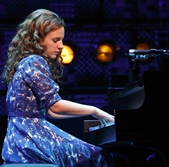SITE GUIDE
REVIEWS
REVIEW ARCHIVES
ADVERTISING AT CURTAINUP
FEATURES
NEWS
Broadway
Off-Broadway
NYC Restaurants
BOOKS and CDs
OTHER PLACES
Berkshires
London
California
New Jersey
DC
Philadelphia
Elsewhere
QUOTES
TKTS
PLAYWRIGHTS' ALBUMS
LETTERS TO EDITOR
FILM
LINKS
MISCELLANEOUS
Free Updates
Masthead
A CurtainUp Review
Beautiful- The Carole King Musical
By Elyse Sommer
|
YOU'VE GOT TO GET UP EVERY MORNING WITH A SMILE ON YOUR FACE AND SHOW THE WORLD ALL THE LOVE IN YOUR HEART THEN PEOPLE GONNA TREAT YOU BETTER YOU'RE GONNA FIND, YES, YOU WILL THAT YOU'RE BEAUTIFUL AS YOU FEEL —"Beautiful" one of Carole King's incredible number of super hit songs. |

Jessie Mueller (Photo: Joan Marcus
|
Singer-songwriter Carole King certainly has enough of a following to make a show featuring songs from her hugely successful albums a strong contender for the jukebox musical sweepstakes. Given that King's own autobiography has already made the best seller list, her personal story is interesting enough to work as a building block for a book musical.
Douglas McGrath's book for Beautiful doesn't have quite the super-strong legs of Jersey Boys. But as staged by Marc Bruni it has enough assets to fill the large Stephen Sondheim Theater for quite a while.
True to its name, there's much that's beautiful about the show. For starters we have the music . Not just the super hits from singer-songwriter Carole King's hit-studded albums (e.g., her break-through "Tapestry"), but some of the early songs by her and first husband and early career collaborator Gerry Goffin and their best friends and rivals Barry Mann and Cynthia Weil.
Beautiful too are the performances. You couldn't want a more ideally cast Carole King than Jessie Mueller.
The 30-year-old Midwesterner has managed to transform herself into the Brooklyn born and raised King without aiming for an exact replica. Like King, Mueller is an accomplished pianist and has a naturally rich voice that evokes King's, but without mimicry.
While the music you hear actually comes from a piano in the pit, Mueller's body language and fingering of the keyboard is authentic. She has a plainness that turns beautiful when she's at that keyboard and sings. Best of all, she brings a Judy Garland-like vivacity and vulnerability to what is essentially a musicalized coming of age story. That story begins with young Carole becoming part of one of two famous song factory at 1650 Broadway (the even more famous Brill Building was a few blocks away at 1619 Broadway). It culminates with her gaining the strength and maturity to let go of a destructive relationship and find the courage to give full reign to her talents as a lyricist and performer as well as composer.
Though Mueller is the show's pivotal character, that plural for beautiful as applied to the performances is more than apt. Jake Epstein doesn't need his recently discarded Superman suit to charm young Carole (and the audience) and keep the prone-to-depression and adultery Gerry Goffin from letting things get too dark or his character from being unsympathetic.
Jarrod Spector and Anika Larsen also deliver beautifully as the other young songwriting team. Spector adds a good deal of humor as the hypochondriacal Barry Mann and Larsen adorable as the gal who, unlike Carole, is not eager to marry and be held back by babies.
Finding an engaging way into the music of a popular musician or group of musicians isn't easy and having King's daughter and manager as executive producer can't have made book writer Douglas McGrath's job any easier. Fortunately his concept for adding Mann and Weill made up for his perhaps having to keep the biographic elements at a somewhat bland simmer, rather than let in more sizzle. The inclusion of some of the Mann and Weil songs ("Who Put the Bomp" / "He's Sure the Boy I Love"/ Walking In the Rain" / We Gotta Get Out of This Place") enriches the overall picture of the years when impresario Don Kirshner (Jeb Brown, another top drawer performance) had young talents like King, Goffen, Mann and Weil turn our songs like workers on an assembly line. The songs were turned out not for the tunesmiths to perform, but for popular, mostly black singers and hoofers in Kirchner's stable.
The set-up of having the young musicians work at 1650 Broadway (an aptly designed Jersey-Boy-ish two-story grid of tiny offices and walkways by Derek McLane) enable director Marc Bruni and choreographer Josh Prince to create an easy flow of lightning fast shifts from creation to performance by the likes of the Shirelles, the Righteous Brothers, the Drifters, Marilyn Wall (A big bravo for the strong on harmony, fleet-footed ensemble). On the lower level of the set McLane has created sliding sets that take us to multiple locations — from the grand piano of the Carnegie Hall stage to a more modest upright in the Brooklyn home where King lived with her schoolteacher mom Genie Klein (a funny and endearing Liz Larsen). . . to Kirshner's offices. . . to Carole and Gerry's New Jersey home. . . to the Bitter End night club in Greenwich Village and back to the Carnegie Hall stage scene that bookends the show.
The aura of this period is also enhanced by the other designers: Peter Kaczorowski's shimmery lighting; Alejo Vietti's costumes (I especially liked the shiny suits and yellow shirts for the Drifters and the Shirelle's sparkly pastel-colored dresses); Charles G. LaPointe's wigs and hair design (Mueller's last curly hairdo close to King's own tresses are a visual metaphor of her all-around growth). Fortunately sound designer Brian Ronan and the pit band have avoided the over-miked sound typical of big Broadway shows, even for those seated as close to the band as I was.
It all adds up to a different and fun way to visit or revisit these songs, many of the early ones probably not associated with King. McGrath's book is not a full or especially revelatory biography but something of a squeaky clean young adult romance novel equivalent that stops just after her Tapestry album put her in the forefront of the singer-songwriter movement.

|
Beautiful doesn't hang its songs on the greatest or most suspenseful story ever told, but it has enough bounce and Broadway show glitz to keep you in your seat — and perhaps jump up to clap along with the cast's peppy encore.
|
Beautiful- The Carole King Musical Book: Douglas McGrath Words and music by Gerry Goffin & Carole King, Barry Mann & Cynthia Weill Director: Marc Bruni Choreographer: Josh Prince Cast: Jessie Mueller (Carole King),Jake Epstein (Gerry Goffin, Anika Larsen (Cynthia Weil), Jarrod Spector (Barry Mann), Jeb Brown(Don Kirshner), Liz Larsen (Genie Klein). Ensemble: Ashley Blanchet, Alysha Deslorieux, Carly Hughes, Rashidra Scott, Joshua Davis, Kevin Duda, Sara King, Clayton Cornelious, Douglas Lyons, Alexander Robinson, James Harkeness. Sets: Derek McLane Costumes: Alejo Vietti Lighting: Peter Kaczorowski Sound: Brian Ronan Wig and Hair Design: Charles G. LaPointe Orchestrations & Music Arrangements: Steve Sidwell Music Coordinator: John Miller Orchestra: Conductor-Jason Howland; Associate Conductor-Jell Tanski;Reeds- David Mann, Dave Rickenberg; Trumpet/Flugel-Trevor Neuman; Trombone/Bass Trombone/ Jennifer Wharton; Guitars - John Benthal, Dillon Kondor: Bass: Zev Katz; Drums- Clint deGanon; Percussion-Joe Passaro; Keyboards- Jason Howland, Jeff Tanski, Nick Cheng Running Time: 2 1/2 hours, including 1 intermission Stephen Sondheim Theater 43rd Street (6/7th Avenues) From 11/21/13; opening 1/12/14 Closing 10//27/19 Reviewed by Elyse Sommer at 1/08/14 press preview |
|
Musical Numbers
| |
Act One
|
Act Two
|
|
REVIEW FEEDBACK Highlight one of the responses below and click "copy" or"CTRL+C"
Paste the highlighted text into the subject line (CTRL+ V): Feel free to add detailed comments in the body of the email. . .also the names and emails of any friends to whom you'd like us to forward a copy of this review. For a feed to reviews and features as they are posted add http://curtainupnewlinks.blogspot.com to your reader Curtainup at Facebook . . . Curtainup at Twitter Subscribe to our FREE email updates: E-mail: esommer@curtainup.comesommer@curtainup.com put SUBSCRIBE CURTAINUP EMAIL UPDATE in the subject line and your full name and email address in the body of the message. If you can spare a minute, tell us how you came to CurtainUp and from what part of the country. |

|


 Book of Mormon -CD
Book of Mormon -CD